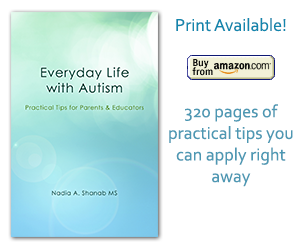All That An Assistive Dog Can Bring To Your Family (Video)
Nadia Shanab | autism, general advice, parenting, tips10 Aug 2015
The proverb says: The dog is man’s best friend. Dogs are loyal and they love their masters unconditionally (I prefer to use the word masters over owners). They communicate without language, and understand the body language. If your child doesn’t talk or has poor verbal skills she/he can still have a social life. A dog would be a close friend, companion, and a confident with whom she/he can share her/his ‘untold’ feelings with. Dogs have no expectations, no requests. They just love their masters no matter what.
- Having a dog at home has a therapeutic effect on everybody in the family, including your child with autism. Dogs provide physical and psychological therapy. A big dog’s hug has a calming effect that competes with the weighted vests, weighted lap pads and even the applied deep pressure. The hug transfers warmth and affection. What a great idea for a natural sensory input!!!
- Dogs teach empathy, compassion and obedience. The bond between your child and a dog can bridge the gap to connect with people more effectively.
- When lonely, your child can have a friend (her/his dog) to play with. A friend who never gets tired of your child. To the contrary, the dog will motivate your child to keep her/his body moving and encourages her/his physical activities.
- Playing with a dog, teaches turn taking and improves social skills. Dogs are social animals, they live in groups/pack. When they join the family, they become part or a member of it. They treat kids of the family as their own off springs.
- The dog is always joyful and playful and sets up the stage for a good mood, peaceful and relaxed atmosphere where ever she/he goes.
- When you are outside, and you can not see or find your child (in the park or in a mall), the dog will guide you to locate your kid. Even if left outside together, dogs herd kids around and make sure they are safe. Dogs stop the kids from wandering off, getting lost, and sometimes they can save lives.
- Dogs have protective nature of children. They wouldn’t let your child walk away with a stranger, and protect her/him from many kinds of dangers.
- Dogs may even stop some child’s undesirable behavior.
- Living with a dog teaches attachment, and helps pull your loner child out of her/his shell. When your child is tired or upset, having a time down with the dog can provide her/him a lot of comfort.
- There are many foundations and organizations specialized in breeding and training dogs. Usually the dog is trained to serve and assist one child for specific needs.
- Having a dog allows the parents to have respite, and encourage them to get out and have “normal” life.
- A dog can bring happiness and joy to the family and take away so much stress.
- A dog offers a huge help and support to single parents.
Important Notice
Assistive dogs are not for all children on the autism spectrum. Even if the dog was bred and trained as a service dog to fulfill certain requirements/criteria, it might still not be an appropriate choice for your kid. Children with extreme sudden movements and severe tantrums might scare the dog. If the child’s behavior is unpredictable, the dog might respond in an aggressive way. You need to be very careful, and know exactly, by consulting professionals, if a dog is a good option for your child or not.
nadia shanab
Tags: affections, asperger's syndrome, assistive dogs, autism, communication, early intervention, flexibility, independence, occupational therapy, organization, parenting, research, sensory, sensory integration issues, service dogs, social interaction, social skills, speech, stress releif, tips, verbal skills

